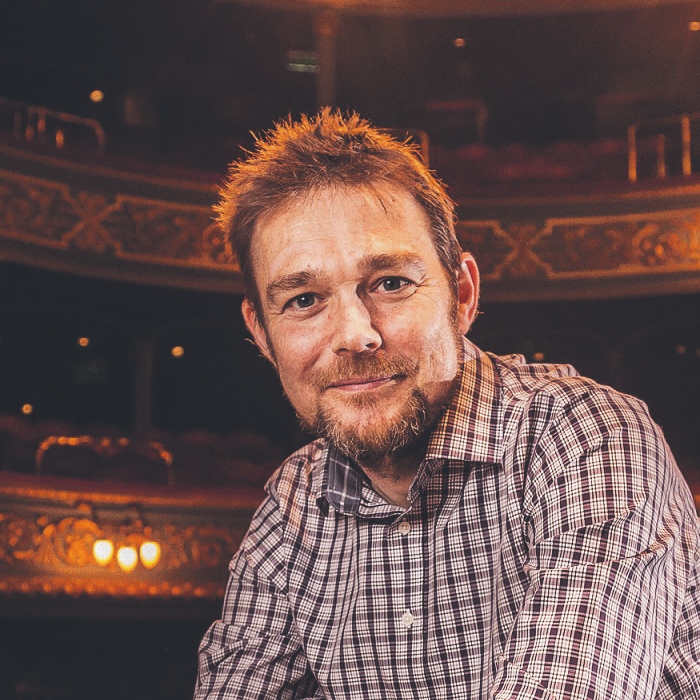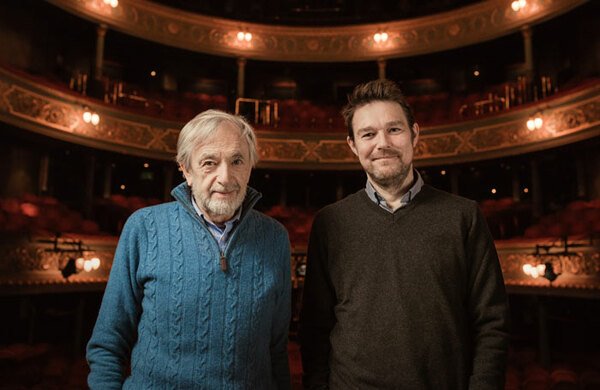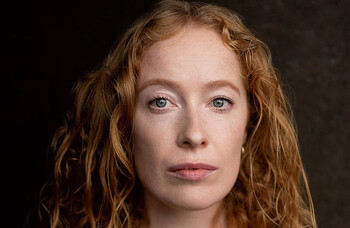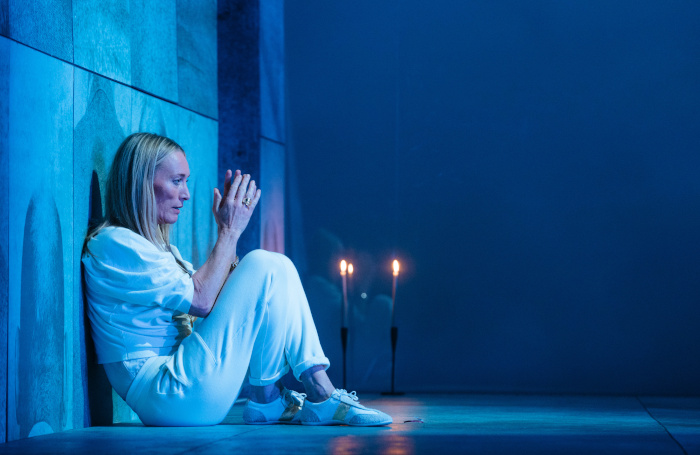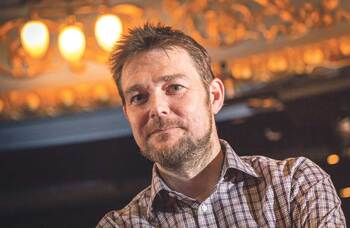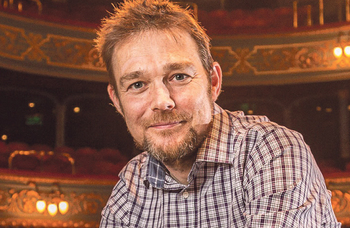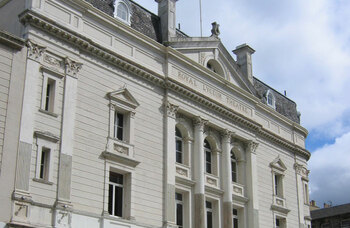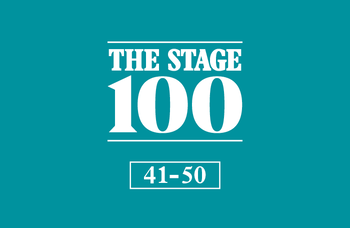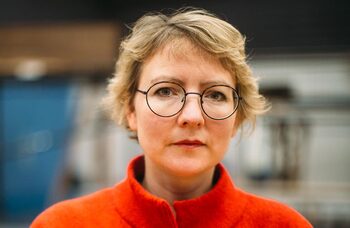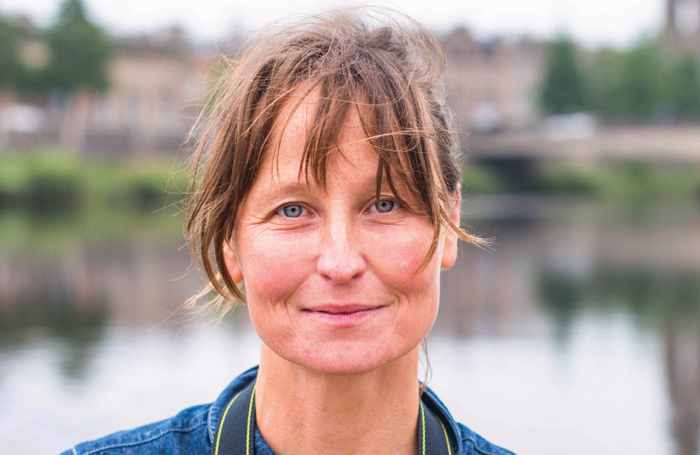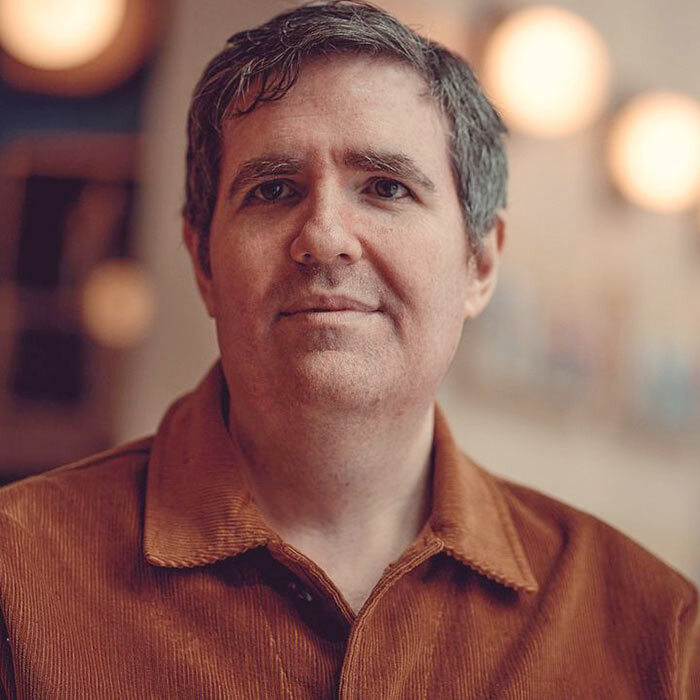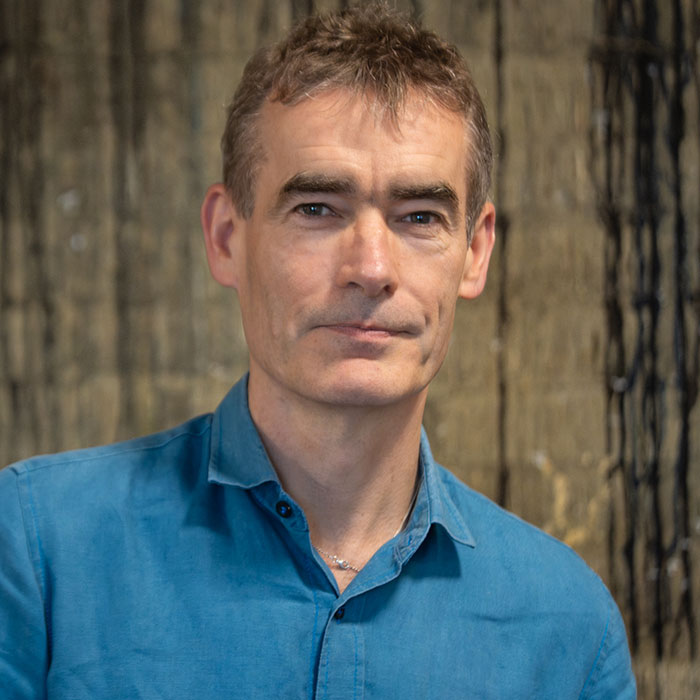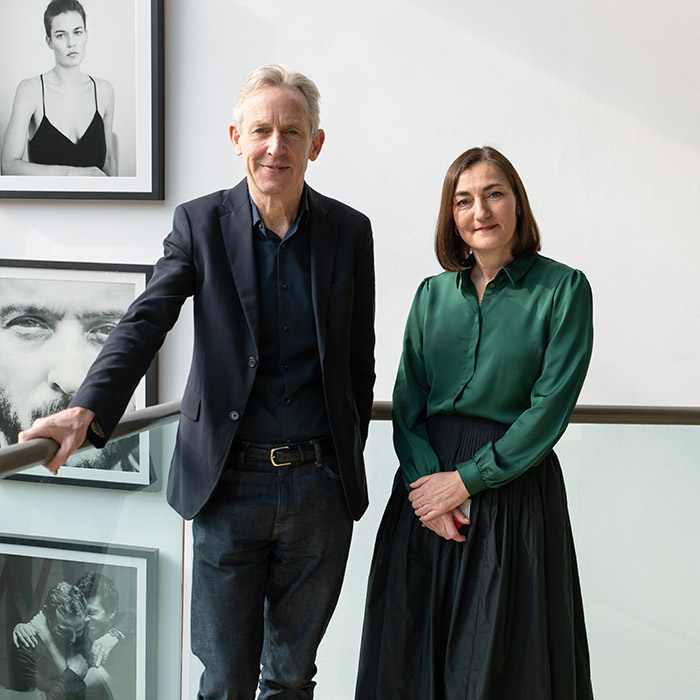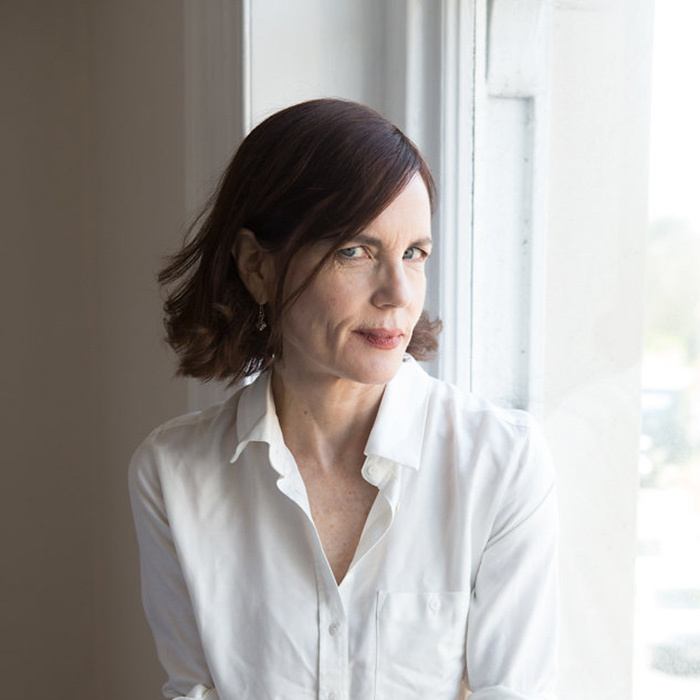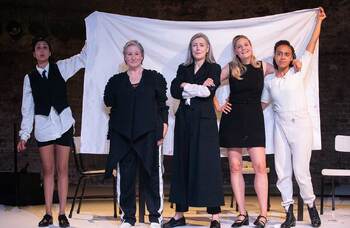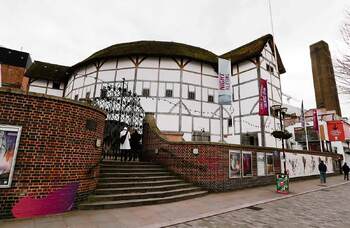David Greig
 David Pollock
David PollockAs well as writing hit shows including Charlie and the Chocolate Factory in the West End, David Greig has been artistic director of the Lyceum in Edinburgh for the past three years. As his adaptation of the much-loved film Local Hero opens there, he tells David Pollock why working in Scotland remains so important to him
Over David Greig’s near-30-year career, he has written such an extensive and brilliant back catalogue of plays that – were there such a thing – he would be in contention for the title of Scotland’s greatest contemporary playwright. But his career has been so diverse that it is not until the late stages of a two-hour interview, sat in a bar at the Royal Lyceum, that we even get to the writing.
Currently uppermost on his mind is the imminent opening of a musical version of Bill Forsyth’s beloved 1983 film comedy Local Hero at the Lyceum, the grand old Edinburgh theatre where Greig has been artistic director since 2016. It’s fair to say his appointment was a surprise at the time – not least because he is identified so strongly as a writer – but the wisdom of the decision has been borne out by the quality and diversity of Greig’s three seasons in charge.
“For me, taking this job was an extension of dramaturgy, really,” says Greig, a thoughtful and methodical speaker who isn’t above a bit of bone-dry humour. “I think I’m an okay director. I’m probably better as a writer, but what I’m best at, actually – what I most value, what I think of as my skill – is dramaturgy. However good I am at the other two things, it comes out of that.”

For Greig, dramaturgy doesn’t stop at the edge of the stage or the end of a performance. “I’ve always seen dramaturgy as a continuum, from looking at a scene and trying to understand how it works, to looking at a whole play, a production, a season,” he says. “Looking at the whole experience of how you see a show, how it’s spoken about, how it’s advertised – all of that is dramaturgy to me. It’s part of the interrelationship between you, your emotions and the emotions of the story: what you expect, how your expectations are raised, how you’re tricked, how you’re delighted. It’s all the way through the process.”
Although he was approached for Local Hero, there are few projects you could imagine being more David Greig than this tale of a mid-level American oil executive sent to the rural Highlands of Scotland amid the 1980s oil boom, who ends up falling for the place and its people. The original featured Burt Lancaster, and gave Peter Capaldi his first screen role.
Greig wrote the new adaptation in consultation with Forsyth, while Dire Straits’ Mark Knopfler – whose instrumental soundtrack to the film was a bestseller – has re-imagined his score as a series of lyrical songs. In the spirit of the residents of Local Hero’s fictional village of Ferness, Greig speaks of giving new visitors to his beloved Edinburgh an enthusiastic guided tour, and of his career-long desire to remain living and largely working in Scotland.
I worked out recently that I’d spent over a full year of my life on the Caledonian Sleeper
That’s a tricky lifestyle choice for a working playwright, but not an insurmountable one, even if he did have to spend time commuting to New York and a full six months virtually living in London while writing the hit 2013 musical adaptation of Roald Dahl’s Charlie and the Chocolate Factory for Theatre Royal Drury Lane.
“It’s the choice you make when you’re a writer in Scotland,” says Greig. “I worked out recently that I’d spent over a full year of my life on the Caledonian Sleeper – now that’s somewhere I feel at home. Actually, I’m really worried, because they’re upgrading the carriages and I’m really nervous to see what they’re like.”

Staying in Scotland
Was there ever a point when Greig’s career might have taken him away from Scotland permanently? “I remember a moment when the Royal Court was dithering about my play Europe, and whether to put it on or not,” he says. “I really am chippy, but I just thought: ‘I don’t care.’ I knew that the Traverse wanted it on the main stage, so I thought: ‘I’m not going to wait around for you to make your decision.’ The day their rights lapsed, I gave it to the Traverse.”
The play was a hit, and Greig remembers it as the point when people really started to notice him. “But I’ve always wondered about the alternative,” he says. “If I’d waited one more week, would the Royal Court have phoned back? Then I would have had a production in London at the same moment as Blasted, Shopping and Fucking, and Mojo. Looking back, I realise what an incredibly different trajectory I could have gone on.”
I never had the experience of the income that comes with a hit. How do you keep that up? You have to go into film or TV
Instead, keeping the work in Edinburgh allowed him to grow into the “Scottish playwright” he very deliberately describes himself as today. It isn’t a decision he looks back on with regret, though it wasn’t always easy. “I had to make three or four shows a year just for the family to stay fed,” he says. “It’s hard to get above yourself when you’re constantly making shows at the Arches or at the Tron. When people ask the playwright Stephen Greenhorn what his biggest achievement is, he says: ‘That I managed to keep making a living.’ I never had a hit, but I never had to follow up a hit. I never had anybody going: ‘Well, it’s not as good as that one’, and I certainly never had the experience of all the income that comes with a hit. How do you keep that up? You have to go into film or TV.”
The way Greig tells it, this extended writing apprenticeship meant it was more than 10 years into his career, around the mid-2000s, that he finally had an inkling that “I knew what I was doing”. The decade began with the powerful and much-revived Dr Korczak’s Example and continued through modern Scottish classics such as the delicate and highly regarded Outlying Islands in 2002, gig-theatre romantic comedy Midsummer six years later, the ambitious Macbeth ‘sequel’ Dunsinane in 2010 and the work for young people The Monster in the Hall the same year.

Given the task of picking a defining moment from among his works, Greig turns to Midsummer, a musical two-hander he directed himself with songs by Edinburgh musician Gordon McIntyre, who fronts local indie band Ballboy. Greig approached McIntyre as a fan, and after receiving modest backing from the Traverse, hired actors Cora Bissett and Matthew Pidgeon for what he thought would be a short run on the Traverse’s smaller stage. It was a big hit, a hit again at the Edinburgh Festival Fringe, and has since travelled the world.
Read our interview with Cora Bissett
“We did it with no expectation of anything, but this show seems to have spread joy wherever it’s been,” says Greig. “It just delights me. The poster for Midsummer is always the same, whether it’s in South Korea or Brazil or wherever, always these two smiling 30-somethings with guitars, against pictures of Edinburgh. There’s a thing you get as a writer or artist where you think: ‘That one was given to me.’ Some you really labour at, you dig and dig, but some you just go: ‘Thank you, Dionysus. I did no work and it just came.’ ”
Like Europe at the Royal Court, Midsummer was another pivotal moment for Greig, which has defined his most recent decade. “When I got the call to ask if I was interested in Charlie and the Chocolate Factory, I had just opened Midsummer at the Edinburgh Fringe and my play Damascus was touring in Middle Eastern countries,” he says. “This was before the Arab Spring, and there were issues around censorship and the regimes were prodding. In retrospect, there was some shit going down that was nothing to do with the play and everything to do with the wider society in which it landed.
“I had this knot of anxiety in my stomach all the time about Damascus. Then I came back and saw people coming out of Midsummer at the Traverse with big smiles on their faces and realised that having the chance to create joy is a huge privilege – and Charlie was a chance to create joy on an industrial scale for 1,500 people a night at Drury Lane. I thought: ‘Right, you’ve got to do that. You have to do it.’ ”
Continues…
Q&A: David Greig
What was your first non-theatre job?
Saturday boy at Rae Macintosh, a classical record shop in Edinburgh.
What was your first professional theatre job?
I was commissioned to write a Lehrstück for the Traverse by Ella Wildridge, the then-dramaturg, in 1993.
What do you wish someone had told you when you were starting out?
You learn from your mistakes and I doubt I would have listened anyway. Don’t do photoshoots in which you lean back on your elbow in a come-hither pose while wearing an Aran jumper.
Who or what was your biggest influence?
I constantly return to the work of Scottish poet WS Graham.
What’s the best advice you’ve been given?
Nothing comes of nothing.
If you hadn’t become a writer and director, what would you have been?
A terrible, bitter novelist living off stolen cabbages in a cottage in Galway, sending amusing letters to local newspapers and with a big cult following on Twitter.
Do you have any theatrical superstitions or rituals?
Many. I never dress up for first night, I have numerous lucky objects, I offer a prayer to Dionysus before the first night of every show at the Lyceum. I’d slaughter a cow but the bloody health and safety won’t let me.
Formative years
Born in Edinburgh in 1969, Greig finds the question “where are you from?” more complex than a one-word answer. His parents – a father who worked in construction and a mother with artistic interests and spirit, if not any professional background – both came from a tight-knit community in Aberdeenshire, yet uprooted to Nigeria for his father’s work within the first year of Greig’s life.
Greig spent more than a decade of his life in Africa, and when his family returned to Edinburgh he attended the all-male Stewart’s Melville College, where he engaged in the most genteel form of rebellion. “I bunked off school to go to the Scottish Poetry Library,” he remembers. “Then we sat by the Water of Leith and smoked and read poetry, which in some ways sounds insufferable. We used to go round the Gallery of Modern Art, and I always had a feeling that this was the world that was of interest to me.
“Then a friend said to Alan Wilkins [Greig’s schoolfriend and later fellow playwright] and I one day: ‘You should come to Edinburgh Youth Theatre because there are loads of girls and no boys.’ That was enough, frankly. I liked the school very much but I really hate all-male environments, I just can’t bear it. That was like a window opening to the world, I went down and immediately knew I’d found where I belong. But unfortunately, I also knew pretty quickly I was a shockingly poor actor.”

Among Greig’s peers at EYT were the future Garbage singer Shirley Manson, and when he went to study at the University of Bristol’s recently opened drama department in the mid-1980s, he found himself alongside contemporaries including Sarah Kane, Simon Pegg and the theatremaker Graham Eatough. His intention was to become a director.
“It was a very good course at Bristol, although still quite a small department,” says Greig. “We still got a grant. You forget all this infrastructure of support for young people: there was housing benefit and unemployment benefit during the holidays. It was an extraordinarily privileged time. I made – either directed, wrote, lit or sound-designed, acted in, or had some involvement in – a show every term for three years. We were this enclave of very left-wing, very shouty young people, in a university that was considered quite conservative at the height of Thatcherism.”
The trend at the time, says Greig, was for directors to radically reinterpret a classic, for example, Stephen Daldry’s version of An Inspector Calls at the National Theatre. Knowing that he would have to do something different to get noticed, he decided to direct new work. However, the £300 student overdraft he took out to hire the back room in the Hen and Chicken pub to put on plays wouldn’t stretch to rights, so he began to write his own plays.
From student shows to setting up a company
The next stage was to take these shows to Edinburgh, and use what Greig calls “a bit of home advantage”. He had a friend who had hired the Roman Eagle Lodge at the top of the Royal Mile to stage work by drama students; Greig talked him into giving him the unsold slots free of charge, and in return offered to run the cafe for him. Greig and Kane were among the writers of these Hen and Chicken plays, Eatough was one of the actors, and everyone would pitch in behind the desk and in the cafe. At night, they would all sleep on Greig’s parents’ floor.
They did this for three years, and in the third year, 1992, Greig’s play Stalinland won a Fringe First and transferred to a tiny room at Glasgow’s Tron. With neither of them keen to move to London, but inspired by the cultural rise of Glasgow’s Mayfest festival, Greig and Eatough decamped to the west of Scotland and founded the Suspect Culture company with composer Nick Powell, a critically acclaimed and enduring endeavour whose methods were close to those of devised theatre.
“Our mission statement was ‘Total Theatre’,” says Greig with a smile. “It was based on the Dutch football system. Like I say, at that time everybody was doing adaptations of classics: there was a big thing about physical theatre, lots of Belgian crashdance, music theatre and experimental postmodern theatre. But what we said was that we were going to have all of that.” Although Suspect Culture is no more, the trio still collaborate, most recently on the pre-Greig Lyceum’s adaptation of Alasdair Gray’s novel Lanark in 2015.
These entrepreneurial early days were all good training for Greig’s current job, albeit on a much smaller scale. With the recent co-production with Bristol Old Vic of Joe Simpson’s memoir Touching the Void proving a bona fide hit, Local Hero on the horizon, and an adaptation of Stanislaw Lem’s novel Solaris upcoming with Melbourne’s Malthouse Theatre, his vision is to turn the Lyceum into a theatre deserving of international attention.
Touching the Void review at Bristol Old Vic – ‘gripping, inventively staged survival story’
“Theatre still has a pretty steady audience,” Greig says, when asked the inevitable question about funding. “But it’s a thing people tend to age into, and it does tend to be a middle-class pursuit. I don’t think: ‘Oh, there’s a crisis because everyone’s watching Netflix’ – if anything, that’s a huge opportunity for theatre – but the economics of regional theatre are really difficult. When I got the job I said a lot about the fact the Lyceum should belong to Edinburgh, and it’s taken me a while to understand that was just rhetoric – that I hadn’t actually worked hard enough and that for it really to belong to the city of Edinburgh we have to do a lot more.
“I’m very passionate about theatre as a placemaking medium, and in taking this job I wanted to intervene in that process,” he continues. “I know this is a slightly tricky one, but I am a nationalist with a very small, wobbly ‘n’. During the Scottish independence referendum, I spoke out about this, but I felt this long before I ever knew any referendum was on the cards. I mean, I bunked off school to read Scottish poetry. I passionately believe that I am part of, and come from, and wish to help flourish and thrive, a thing called Scottish theatre. I’ve always felt that I’ve been given an awful lot by Scottish theatre, and I really want to see what I can do to make it better.”
CV: David Greig
Born: 1969
Training: University of Bristol
Landmark productions:
• Europe, Traverse Theatre (1994)
• The Cosmonaut’s Last Message to the Woman He Once Loved in the Former Soviet Union, Tron Theatre and Paines Plough (1997)
• Yellow Moon, TAG (2006)
• Midsummer, Traverse (2008)
• The Strange Undoing of Prudencia Hart, National Theatre of Scotland (2011)
• Charlie and the Chocolate Factory, Theatre Royal Drury Lane (2013)
• The Events, Actors Touring Company (2013)
• Touching The Void, Edinburgh Royal Lyceum and Bristol Old Vic (2018)
Awards:
• Critics’ Awards for Theatre in Scotland for best new play for Outlying Islands (2003)
• CATS award (with Wils Wilson) for best production for children and young people for Gobbo (2007)
Agent: Mel Kenyon
Local Hero runs at Edinburgh’s Royal Lyceum Theatre until May 4. Details: lyceum.org.uk
More about this person
More about this organisation
Big Interviews
Recommended for you
Opinion
Most Read
Across The Stage this weekYour subscription helps ensure our journalism can continue
Invest in The Stage today with a subscription starting at just £7.99
